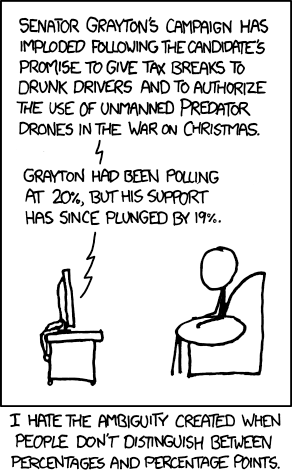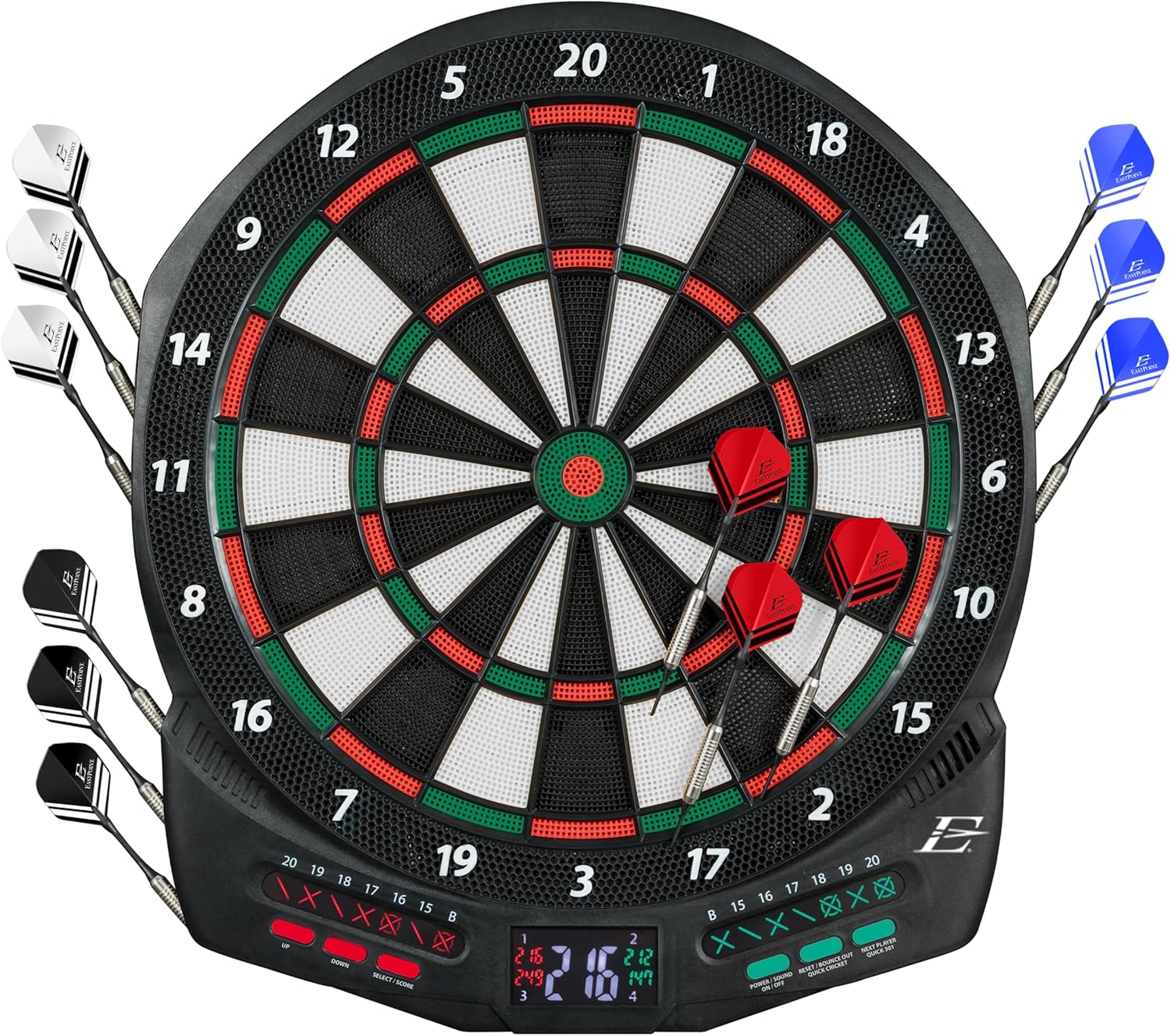Can’t believe nobody has linked the relevant xkcd yet

We appreciate your service.
🫡
🫡
Which of course is why people referred to points when discussing stocks/markets. Got to love an unambiguous term.
Having two possible outcomes does not mean it’s a 50:50 chance.
“So if I aim the arrow at the 1cm square from 100m away and shoot, I either hit it or I don’t. So basically I have a 50% chance of hitting it.”
My wife, father-in-law and I were playing a board game with my brother-in-law. In this game, we were playing as detectives who have to try to find his character, but each turn he could move in secret in one of several directions. We were a few turns in at one point and he could have been in any of dozens of places at this point. We drove him nuts by saying “he’s either in this spot or he’s not, it’s a 50-50 chance.” He kept arguing “I could be in a ton of places! It’s not a 50-50 chance!” But we just kept pretending we didn’t understand and arguing that there were only two possibilities, he’s there or he’s not, so it was clearly a 50-50 chance. He got quite angry.
Scotland Yard or Letters from Whitechapel?
I love Scotland Yard. We got it for a friend who loves detective stories. Then discovered that it’s a public transit simulator which is even better.
Honestly, Letters From Whitechapel is a better design of the same concept.
For detective story games, Sherlock Holmes Consulting Detective is amazing.
And for public transit games, Bus is the way to go (probably)
Lol Sherlock Holmes consulting detective is probably fun as a single player game, but we played it as a party game (cause it said you could do that) and the result is just chaos.
We got on what we were pretty sure was the right track and got into some rabbit holes, brought it back to Sherlock and he basically told us to fuck off and die and we earned negative points. I think we got one part of one of his answers and didn’t even visit most of the places that would have given us at least a few answers.
Great for a laugh though.
I would say it should be fine as a solo game if you’re into that, but better as a 2-3 player game to have someone to discuss and bounce ideas against.
I can imagine that as a party game it would be chaotic for sure!
Definitely needs the right group, and I think you can’t take the scoring too seriously, especially playing in larger groups. Pretty sure I also have never had a positive score even in a smaller group.
Yeah that’s why I say it’s good for a laugh. If a game is nearly impossible to get a decent score in, it can’t been taking itself too seriously. You’re meant to sit back and watch the master Sherlock Holmes do his thing and nail the mystery. Often it’s fun and you get some “oh yeah” moments where he points out a detail that makes a lot of clues click, but sometimes the leaps in logic are just unhinged. Also there was another mystery I remember distinctly where in order to get the correct line, you had to have some random bit of trivia knowledge about Sherlock-era English style cause it was based on someone’s hat.
Now that I write this, I bet there’s a lot of fun bits for people who have read all of the Sherlock books and “get” the logic of that world.
We bought it at goodwill on a whim knowing nothing about it. Good to know about your other suggestions. Thanks!
Public transit simulator! No way
Letters from Whitechapel
Letters from Whitechapel?
Either that or you buried the lede by failing to mention something rather significant about the hidden character, and you were playing Fury of Dracula. Or my boardgamegeek-fu isn’t as strong as I hoped.
Yeah it was Letters from Whitechapel.
you know, if you watched for tells, that could tilt the probabilities… and I bet with the frustration… he was flashing tells all over the place…
deleted by creator
You’ve already failed.
You have to commit hundreds of felonies. In broad daylight. And brag about it.
Threaten witnesses. Delay everything.
And only be convicted of 34.
Then not get sentenced.
Very weird fun fact about arrows/darts and statistics, theres 0% chance of hitting an exact bullseye. You can hit it its possible to throw a perfect bullseye. It just has a probability of zero when mathematically analyzed due to being an infinitesimally small point. Sound like I’m making shit up? Here’s the sauce
How can an outcome both be entirely possible and have 0% probability?

Q.E.D
You must not be playing on a soft tip board.

On the other hand: Half of my lottery tickets were jackpots. I never played and have (1/2 * 0 = ) 0 jackpots.
The thing with that is that it’s actually a useful generalization to make in a lot of scenarios.
If you know nothing about the distinction between two possible outcomes, treating them as equally likely is a helpful tool to continue with the back of the envelope guess. Knowing this path needs 5 coin tosses to go right and this one needs 10 is helpful to approximate which is better.
Your example is obviously outside the realm where you have zero information, so uniform distribution is no longer the reasonable default. But the idea is from a reasonable technique, taken to extremes by someone who doesn’t fully get it.
That’s not even a stat question, it is a english question. It is an increase by 80% not to 80%
Statistics only come to play to figure out our new chances.Maybe I’m wrong but by writing “increase by 80%” there is ambiguity you don’t get if you instead spelled out:
- Increase by 80 percent
- Increase by 80 percentage points
I’m not an expert either and your second option is definitly clearer than mine but I believe the % symbol doesn’t have the meaning of percentage point.
It is better to make things easier for people to understand but people should also make the effort of properly reading even when it is not fully dumbed down. These are prepositions, so basic english not scientist jargon.
Im a high school maths teacher and that’s what we’re supposed to teach, % means percent, not percentage points. Maths always tries to have agreed-upon unambiguous definitions of things, precisely to avoid confusion.
Maths always tries to have agreed-upon unambiguous definitions of things, precisely to avoid confusion.
Laughs in ambiguous notation
I thought of an example or two and corrected my comment to ‘tries to’ as I was typing haha
Or “by 80 percentage points”
“By 80 percentage points” means add 80 more points to a number of percentage points, so 5% becomes 85%. “By 80 percent” means add 80 percent of the current value.
I know. By x % and by x percentage points is the most commonly confused pair, not by x % and to x %.
In game design, it has to be stated whether it’s multiplicative or additive. Sometimes a logarithmic function is used as well, with increases in efficiency as 1 / ( 1 + bonus ). This allows you to always add more bonus, but there’s diminishing returns.
i wish it was more common to also indicate the precedence of a percentage increase, so that it’s easier to know if i’m dealing with (x + y ) * z or x + (y * z). although that’s admittedly a lot harder to communicate.
Just include a glossary of formulas for figuring out stats/chances/whatever in your game. With clearly labeled variables. Then throw a reference to that glossary in your tooltips/helpful popups.
Wouldn’t it be easier for everyone to instead not add such systems? After all, don’t many go for the simple logic of bigger number is better instead of doing the math?
This upgrade adds +100% critical chance.
The weapon has a base critical chance of 10%, so the new critical chance is 20%, not 110%
In game design +100% would be 10% + 100% = 110% crit.
Increases by +100% = base + 100%
Increases by 100% = base + base x 100%
When my son was about to be born my mother in law caught wind that we didn’t plan on circumcising (before researching it I mostly felt it was just strange to do cosmetic surgery on a newborn) but her argument was mostly parroting the 50% reduction in this that and the other disease, missing the fact that it was going from a 0.5% chance to a 0.25% chance, but of course introduced new risks by nature of being a surgery.
Naturally after looking more into it I learned just how bonkers circumcision is so I was far more cemented in my position
The fact that it is even allowed in so-called civilized countries is outrageous. In the US it common because some religious nut was obsessed with children’s masturbation.
Which is nuts, as a circumcised individual (medically necessary, my parents aren’t monsters) I masturbated A LOT as a teen.
it baffles me that anyone with a penis, or really anyone who knows what a penis actually is, would think it’s a good idea
would people remove a child’s eyelids? NO OF COURSE NOT holy shit
piercing flesh is generally to be avoided unless absolutely necessary, as is helpfully indicated to us by it being fucking painful
I play video games; I need to know if the percentage is additive or multiplicative.
“+100%” looks pretty good until you see what “×25%” actually gives you.
×25% gives you 1/4 the original value, whereas +100% is double the original value, let’s say 8/4 to keep it consistent. ×125% (in case a 1 is missing) is still only 5/4 the original value.
Is there a typo in your comment?
In video games they commonly use that to mean they are multiplying by 25. We know it’s not correct in stats. This is why game wikis commonly put the actual formula for things rather than the tooltip the developers wrote.
Biggest lie in a game’s tooltip/description of an item was how the formula for Armor Piercing rounds in Fallout 1 and 2 was bad, so instead of being stronger than regular rounds, they were weaker.
Games use x25% or x25? Technically the first divides the score by 4.
We are aware of what it actually does mathematically. Please re-read what I wrote.
I was asking for clarification. Do many games really add the % to x25?
Yes. Just off the top of my head, I see any kind of Diablo-like game doing it a lot. Shows everything as a percentage, but some items are just adding that number (not a percentage) or multiplying the number (also not a percentage). It’s like they just treat the % as meaning “alters number in mysterious ways.”
Warframe has a mod card will say like +200% but you don’t want that one, because it’s adding, while there is a multiplying one that will say +4, and it’s just multiplying it by 4 instead of the +200% which is only adding twice as much to the base value. If you had 100, the +200% thing gives 300. But the +4 is 400. And the way this is displayed in the game does not make sense so you’ll always think the +200% is better unless you check the wiki (or put it on your gun and play around with it).
deleted by creator
I feel they might’ve left something out. If you’re at base value still an additive 100% increase (1+1=2) is better than a multiplicative 25% (1×1.25=1.25) increase but in games where bonuses stack another additive 100% increase would raise the effective value by 50% instead (1+1+1=3) whereas another multiplicative 25% would still raise the total by that much (1×1.25×1.25=1.56) so if you’re stacking a lot of bonuses, eventually the multplicative ones are more effective. As for how many steps it would take to be equal in our example… 1+1×X=1×1.25^X I’m not gonna do this in my bed on my phone but that equation should already tell you that the right side grows faster when X -> infinity
It’ll become greater after 12 applications:
- For 11 times 1.25¹¹ ≈ 11.64 < 12 = 1+ 1×11
- For 12 times 1.25¹² ≈ 14.55 > 13 = 1 + 1×12
There’s no need for a precise solution since it’s integers anyway.
Funny thing is this is a language issue, not a math issue.
Why not both?
I’ve always thought of math as a language and I talk to my kids about it that way too. Math is an other way to describe the world.
It’s very different from spoken languages and translating between the two needs to be learned and practiced.
Our math education doesn’t include enough word problems and it should be bi-directional. In addition to teaching students how to write equations based of sentences we should teach them how to describe what’s going on in an equation.
Yeah, it is kinda both in general. Though in this case, the math about this is well-defined: it’s possible to increase a percentage either with addition or multiplication and both of those can make sense, just the words we would use to describe them are the same so it ends up ambiguous when you try going from math to English or vice versa.
But the fact that switching between communication language and a formal language/system like math isn’t clear cut does throw a bit of a wrench in the “math doesn’t lie”. It’s pretty well-established that statistics can be made to imply many different things, even contradictory things, depending on how they are measured and communicated.
This can apply to science more generally, too, because the scientific process depends on hypotheses expressed in communication language, experiments that rely on interpretation of the hypothesis, and conclusions that add another layer of interpretation on the whole thing. Science doesn’t lie but humans can make mistakes when trying to do science. And it’s also pretty well established that science media can often claim things that even the scientists it’s trying to report on will disagree strongly with.
Though I will clarify that the “both” part is just on the translation. Formal systems like math are intended to be explicit about what they say. If you prove something in math, it’s as true as anything else is in that system, assuming you didn’t make a mistake in the proof.
Though even in a formal system, not everything that is true is provable, and it is still possible to express paradoxes (though I’d be surprised if it was possible to prove a paradox… And it would break the system if you could).
Yes. I really think that the translation part is one of the hardest.
As a brief aside, I want to note that this conversation is happening in one of the languages we’re discussing and that could influence any conclusion we come to. I’m also going to suggest that we ignore Gödel for now
There are many people who are good at math. There are even a lot of people who are reasonably good at grinding through the mechanics of math. That doesn’t solve any of the problems you described above.
Statistics are a great example of this. Early statistics classics are mostly about the mechanics; here’s how you calculate the mean, standard deviation, confidence intervals, etc. 2 types of students generally come out of that class; math students who will forget all of that because they’re going to learn the “real” versions (eg they go through a huge number of proofs that involve calculus and linear algebra), and students who will forget all of that because the whole thing sounds like gibberish.
We teach natural languages the same way but we go much farther. Students learn vocabulary and grammar rules but they’re also expected to learn how to use them correctly. We had students current events articles and ask them to analyze them. We ask students to practice many writing methods including fiction and expository writing.
When I talk to my own kids about statistics I never write any formulas. I ask questions like, “What do you think ‘mean’ means?”, “If I have a bunch of <example item> does ‘mean’ describe it well?”, “What happens if I add an <example item> with <huge outlier>? Do you still think it’s a good description?” “How would you describe it better?”
If I ever had to design an introductory statistics course it would contain very little “math”. Classes, homework, projects, and tests would consist of questions like; “Here’s some data and an interpretation, are they lying? Why or why not?” “Here’s a (simple) data scenario. Tell me what’s going on.” “Here’s some (simple) data. Produce a correct and faithful summary. Now produce a correct but misleading summary. Describe what you did and the effect.” “Here’s a conclusion. Provide sample data that most likely fits the conclusion.” “Change one word in the sentence, ‘Increase your chances by 80% means that there is now an 80% chance.’ to make it a true statement.”
It’s really pretty simple - if something increases by 80%, you add 80% of whatever it already is… one dollar becomes $1.80… one percent becomes 1.8 percent.
Most people don’t understand it because they’ve seen it done wrong so often, the wrong way seems right.
I’m quite willing to bet that 70% of the population has no clue that percentages, fractions, and decimals are the same thing.
That’s about 60% more than expected
You mean 38 percent points higher ?
Then odds show up to the party and upend everything we thought we understood.
I think you can increase that by about 7.5/10%
Is that 7.5 percent or 7.5 percentage points though? :/
11%/10% with rice
I work in a place full of statisticians, and we’ve had to unfortunately have numerous conversations with some of them about the difference between “a decrease” and “a decrease in the rate.” Apparently “it’s increasing slower” isn’t clear enough for some.
Maybe I’m understanding wrong but a decrease in the rate would be the derivative of a decrease. Aka the slope of the line. So if you are decreasing at -x. Rate of decrease is -1.
Unless I follow your wording incorrectly. Obviously it isn’t always so nice of a function in real stats. Is that what they are missing?
I think it’s more y=5x and then y=3x, so you’re still increasing, but the rate of increase has decreased. Versus y=-x where the function is now decreasing.
This is exactly the issue that happens. They write things out narratively like a decrease happened, which would cause some panic in certain groups we work with, and then they would argue when we requested they fix it to represent a decrease in the rate of increase, or a slower/lower increase than prior, or however they wanna say it. But it certainly didn’t decrease.
So the derivative of the derivative, lol. It goes all the way down in math, physics though, that guys a jerk. (Sorry for the bad joke)
I’ve always wondered how to disambiguate multiplication and addition of percentages. I guess that’s what percentage points are for?
10% of your people vote for a party.
The votes increase by 10% => now 11%
The votes increase by 200% => now 30%
The votes increased by 50 percent points => now 60%
The annoying part is that there is no well-known notation for showing percentage points, so people use % for both percentages and percentage points.
In deep rock galactic survival, the color of the number is different for percentage and percentage points
We really should just have a different symbol tho. Maybe we do, I’m not a math wiz, but we certainly don’t have a broadly used one.
I’d love to see percentage points as a symbol that’s literally “%” with dots in the circles
I like how some games use “increases by +10%” as percentage points and “increases by 10%” as percentage.
Or how oath of exile does it, with “(base + base * increases by y%) * z% more”
So with a base of 5%, chance increased by 20%, and chance increased by 30%, with a 40% more chance, you’d get:
(5% + 5% x (20% + 30%)) x (1+40%) = 7.5% x 1.4 = 10.5%
Exactly. Unfortunately, they aren’t used widely and consistently enough. Even in the press. So you frequently have to second guess what you’re reading.
well it’s ambiguous. Its also a sloppy way of expressing an increase by 80 percentage points.
That’s not sloppy, that’s simply wrong
Fair enough, I’m inclined to agree. It’s a relatively common error though, still leaving it ambiguous outside of circles where you expect people to express themselves with mathematical precision.
Wrong: I had a 1% chance, and I doubled my chances. Now my chances are 101%.
Right: I had a 1% chance, and I doubled my chances. Now my chances are 2%.
Wrighongt: I had a 1% chance, and I doubled my chances. Now my chances are 3%, because I’m a lucky person.
Sleep deprived fraction lover: I had a 1% chance, and I doubled my chances. Now due to 1/100 * 1/100 I chances are 0.0001%.
Difference between increase of x% (old percentage + old percentage * x%)% and increase of x percentage points (old percentage and x)%
People got this wrong about inflation as well. In 2020 there was actual deflation, and in 2021 there was very minimal inflation, meaning prices were still largely lower or similar as 2019. Then we saw 9% inflation in 2022. Total inflation in 2024 vs the 2019 benchmark was around 15%. Or 3% average per year, which is barely over the baseline. People just hear 9% inflation, completely missing the fact that this was a YoY number relative to the Trump recession.
And then there was that bogus article that said Argentina had lowered it’s inflation to 2% and you find out in the article that’s monthly inflation and the yearly figure was like 190%.
If they managed to decrease from 190%/year to 2%/month (which is 27%/year) that’s still an impressive result. Not as impressive to publish when you want to make a click bait.
I’m not sure how to put that to percentages thought, is it 86% and 143 percent points decrease?
Drag doesn’t know exactly what the problem is, but the official inflation figures cannot be right. Housing is so much more expensive. Food is more expensive. And it’s not 9% more expensive. Drag knows they say the math takes into account the price of rent, but they’ve gotta be lying somehow. It’s impossible that the cost of living is rising so much faster than inflation. Those should be the same. If they’re not the same, someone’s math is wrong.
I keep track of my grocery bills going on 10 years now and 14-15% is spot on for what I buy.
Housing is more than 15% more expensive
It may as well be accounted in the inflation, but with a lower weight. Usually the institution responsible for calculation of the inflation will publish the methodology so one can see for emselve, real perceived inflation may be higher or even lower depending on what your consumption profile is.
Won’t your consumption profile necessarily change if rent is raised and you have to buy fewer luxuries? Do the calculations take that into account?
So you’re telling me there’s a chance?

















